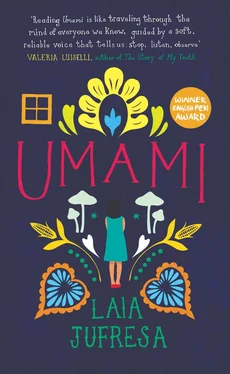I swear some girls in my class talk about having learned to use a tampon like it was sailing across the Atlantic. All that’s missing is the slideshow, like the one Emma gave us when she came back from Niagara Falls.
The flower arrangements at the stall are for old ladies. For dead old ladies or for old ladies who think their dead were really cheesy. I take three sunflowers, pay for them and, getting back into the car, remember something basic: Luz isn’t buried where we’re going.
‘Next year,’ I say to Dad, putting on my safety belt, ‘we’ll bring flowers from our yard.’
Dad starts the car and corrects me:
‘Our milpa .’
Then, smiling, he uses the name, maybe to make up for Mom’s reaction earlier:
‘Luz would have loved your milpa .’
*
The grave is small and made of cement, not too different from my planters, only with a lid. The lid says: Luz Pérez-Walker, 1995–2001 . And underneath: Beloved daughter and sister . Be-loved. Like an order. I’d fantasized about this moment, about what I’d say to Luz. But in my fantasies it was raining and Luz was somehow able to listen to me. Now the sun is beating down and there’s not a patch of shade in the whole cemetery. She’s dead, and I have nothing to say to her. Was she beloved? She was my sister. ‘Bina’, she used to call Pina. ‘Sana’, she used to called me (a mix between sister and Ana, although she didn’t come up with it: Olmo and Theo used it before her). One time, Bina and I changed her outfit twenty times and put makeup on her: she’d let us do anything. Yes, I guess she was beloved. Her death certificate was made in Michigan. DECEASED , it says in capital letters. I hate this word. It sounds like diseased. But you can be cured from a disease. And, anyway, Luz wasn’t sick. She even knew how to swim. She must have got caught up in something, that’s what we think. Luz’s body is in ashes in the lake. At the time it seemed logical, to cremate her and put her to rest with Granddad. But now I can’t understand it: why would we leave her there? I wonder if my brothers think about her while they’re out fishing. I wonder if they have anything to say to her.
I brought Alf’s big shears with me, but I don’t spot a single weed. I use them to cut the stems of the three sunflowers then I arrange them on the grave until Dad and I agree on a nice composition. But almost straight away I mess them up again. If there was one thing Luz wasn’t, it was tidy. Dad agrees.
‘When she was really little,’ I remind him, ‘she used to get baby food everywhere.’
He laughs.
‘One day,’ he adds, ‘I had to clean mush from the ceiling. The first time that ever happened out of all four of you kids. That girl had arms like a baseball player.’
A blow to the chest, there, a few tears that come to my eyes but don’t fall. ‘That girl.’ That’s exactly what we no longer have for Luz. What is it? Irreverence? Nerve.
‘You little shits,’ Dad calls my brothers sometimes.
‘Scaredy-cat!’ he says to me when I refuse to eat chili.
Being dead means this, too: nobody dares insult you anymore, not even out of love.
I feel good when we leave. Sad but interesting. And clean. The only thing missing is the soundtrack. I ask Dad to sing something and who knows why but he breaks into ‘ La donna è mobile qual piuma al vento, muta d’accento e di pensiero ’, a family classic. Mom used to sing it in the mornings.
‘Now I feel like a pizza,’ I tell him, and he passes me his phone.
I call Mom and she asks for a bacon-and-onion pizza, even though normally she refuses to eat anything from a box. Dad cries at the wheel on the way to the pizzeria. Discreetly. No heaving chest, no little sobs, just tears running down his cheeks, like in the pictures the guy in the park near our house used to make: he would kneel down on the floor, and with a spray can and a spatula paint the same scenes over and over, in a matter of seconds. His favorite subject was a clown with a single tear rolling down his cheek. Now I realize I should’ve given him some credit: it turns out that there are actually people out there who cry like that, in my own home even. Isn’t this called a revelation? Some people might call it that.
When we get home, Mom’s not angry anymore. She’s sad and gentle: she eats some pizza and says it’s good. Afterward, we flop on the sofa together and she strokes my head.
‘It shouldn’t be called an anniversary,’ I say.
‘That’s what your dad always says,’ she replies.
‘I invented a word.’
‘What is it?’
‘Graycholy.’
‘One of Marina’s.’
‘Yeah, I borrowed it. By the way, are you going to make it up with her?’
‘If Chela and Pina made it up, why not, eh?’
‘What’s that got to do with anything?’
‘Did you pull up the weeds?’
‘There weren’t any.’
‘Hm. It must be because there’s no body there.’
‘What’s that got to do with anything?’
‘Could you bring me a blanket?’
*
Dad comes with us on our second trip to the garden center, to oversee his investment. But he’s his own budget’s worst enemy. Pina and I watch as he falls prey, over and again, to the shop assistant, but we don’t say anything. I’m glad Pina’s back and that she seems as psyched about the plants as I am. It’s another assistant today: not the pervert, but a young guy with dreadlocks. He makes me feel awkward. I chew the inside of my cheek, then force myself to talk to him.
‘I’m regenerating the oxygen in my mews,’ I tell him.
‘Nice,’ he says, his eyes on Pina.
We leave the garden center so overloaded with goodies that Dad decides to go get the car. While we wait for him at the entrance, a lady comes up to us.
‘How much for this?’ she asks, pointing to our newly acquired cherry-tomato plant.
Pina butts in before I have time to answer.
‘Two hundred pesos, señora . Go ahead, try one.’
The lady tries a tomato and buys the plant off us. I’m so impressed I’m lost for words. By the time Dad parks up and opens the trunk, Pina is already back, a replacement cherry tomato plant and eighty pesos change safely tucked away in her pocket. She got back yesterday, but she still hasn’t told me anything about her mom. She says to wait till she develops the photos. She took her old film camera, but now ‘Chela has a digital one.’ It makes me sad that she calls her mom by the same nickname we all use for her. I must have pulled a face because next thing she says, ‘She asked me to call her that and I like it.’
‘OK,’ I say, ‘OK, sorry.’
In total we have: two aloes, a lemon tree, a lavender plant, and various unidentified succulents. After today’s trip we can add the cherry tomatoes and two specimens of a tall plant called Monstera deliciosa , but which for some reason has the nickname ‘skeleton’. It has huge, dark green leaves with roundish holes in them. I guess that’s where the name comes from: the holes being the eye sockets in a skull. Or maybe it’s subtler than that: the holes the dead leave behind, something you can’t say. We also got a few other pretty plants: one of them looks like a red cabbage; the others are all green. I’m going to put those ones together in the planter nearest the house, because according to the dreads guy they like the shade. I already have the soil for the milpa corner (the milpa has been ‘downsized’ and now occupies just one corner), and next week we’ll go buy the turf. I’m pretty excited about that as well. As I understand it, you just lay it out like a rug.
As soon as Dad leaves us alone in the yard, Pina lies face down on the picnic table. She’s wearing a pair of hot pants so short you can see the smile of her butt cheek poking out on one side. It reminds me of last summer: we were sitting on a bench outside a shopping mall when a girl walked by and Emma said, ‘She’ll kill herself if she falls off that skirt.’
Читать дальше












